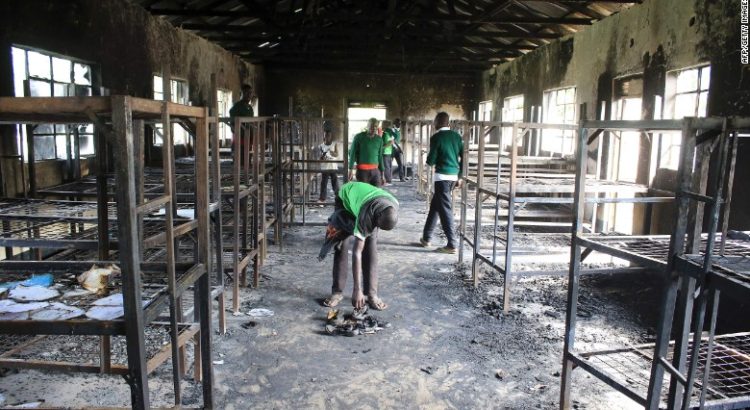Africa/Kenya/06 de Agosto de 2016/Autora: Briana Duggan/Fuente: CNN
RESUMEN: Una ola de ataques incendiarios ha quemado cerca de 120 escuelas secundarias desde junio a través de Kenia, donde las autoridades han identificado a un culpable desalentador: los estudiantes. Los incendios, que en su mayoría se dirigen a los dormitorios, han destruido útiles escolares y pertenencias personales. Otras escuelas han cerrado preventivamente por miedo a más incendios. Mientras que los ataques incendiarios en las escuelas no son un fenómeno nuevo en Kenia, la tasa cada vez mayor de los incendios tiene todos los ojos en los desafíos que enfrenta el sistema educativo de Kenia. La gente y los motivos detrás de las llamas siguen sin estar claros, pero muchos sospechan de los estudiantes, citando la ira de los estudiante por las nuevas y estrictas políticas destinadas a la limpieza de escuelas después de una serie de escándalos de engaño.
A wave of arson attacks has torched about 120 secondary schools since June across Kenya, where authorities have identified a dismaying culprit: students.
The fires, which mostly target dormitories, have destroyed school supplies and personal belongings and forced thousands of students out of school. Other schools have preemptively closed out of fear of more blazes.
While arson attacks in schools are not a new phenomena in Kenya, the escalating rate of the fires has all eyes on the challenges facing Kenya’s education system. The people and motives behind the blazes remain unclear, but many suspect students, citing student anger about strict new policies intended to clean up schools after a series of cheating scandals.
The fires have caused several minor injuries but no deaths, which some people say suggests that students had prior knowledge of the blazes.
«Students have a lot of tension over the sudden change of programs. They are venting their frustration and anger through fires,» said Wilson Sossion, Secretary General of the Kenya National Union of Teachers.
«It is a clear coded message: they want to have more time at home than at school.»
In recent months more than 45 students have been charged with arson in connection to the school fires, according to Kenya media reports. On Tuesday alone, 13 boys were charged with burning a dormitory and classrooms at their high school in Nairobi. They have denied the charges.
The recent spate of school fires began after Kenya’s Ministry of Education announced new reforms in May which cut school holidays by several weeks and limited social events, prayer days and parental visits. The changes were part of broader reforms aimed at curbing cheating on exams, in part by limiting contact between students and outsiders who take payments to send them exam answers via mobile phone.
The man behind the strict new policies, Education Minister Fred Matiang’i, has stood by the measures. He has blamed the arson attacks on the cheaters themselves — students who were angry they could not access national examination papers in advance of their exams.
«Students who have been arrested and are facing charges have told police that they were protesting because they had paid for the (exam) papers but they have not received them,» Matiang’i told the Daily Nation.
Reports of cheating abound in Kenya, where some 7,000 primary and secondary school exam results were canceled last year due to concerns over their legitimacy.
In a country where school fees are prohibitively expensive for many, meaning that only about half the school-age population attends secondary school, the slew of arson attacks has caused a flurry of chatter and questions within Kenyan society.
Many Kenyans have questioned these divisions in the east African country and blamed parents for raising a generation of kids they see as entitled and overworked. Others question the quality of schools.
But Sossion, of the teachers’ union, says the problem is not about privilege.
«It’s the right of every child in Kenya to access education of good quality,» he said. «You cannot teach students who are not happy. They must be happy and they must be comfortable.»
Fuente: http://edition.cnn.com/2016/08/03/africa/kenya-school-fires-education-reform/index.html







 Users Today : 103
Users Today : 103 Total Users : 35460009
Total Users : 35460009 Views Today : 149
Views Today : 149 Total views : 3418614
Total views : 3418614